|
|
|
Sort Order |
|
|
|
Items / Page
|
|
|
|
|
|
|
| Srl | Item |
| 1 |
ID:
095018
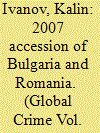

|
|
|
|
|
| Publication |
2010.
|
| Summary/Abstract |
For both objective and subjective reasons, the European Union devoted unprecedented attention to the problem of corruption in Bulgaria and Romania. The European Union (EU) faced a complex challenge in wielding its arsenal of carrots and sticks to encourage reform in the two countries. Conditionality was further complicated by rivalries between Sofia and Bucharest. Despite its limits, EU pressure presented a rare opportunity to depoliticise anti-corruption policy. After accession, Romania regressed from its previous achievements against corruption, and Bulgaria remained reluctant to prosecute senior officials or confront organised crime. Nevertheless, the European Commission continued its monitoring activities, and its ability to freeze funds maintained a modicum of pressure for reform. More effective anti-corruption efforts are possible if a domestic constituency for reform gains sufficient momentum to replace the EU's waning influence.
|
|
|
|
|
|
|
|
|
|
|
|
|
|
|
|
| 2 |
ID:
106148
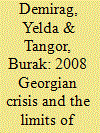

|
|
|
| 3 |
ID:
125302
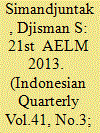

|
|
|
|
|
| Publication |
2013.
|
| Summary/Abstract |
Aspiring to serve the world as inclusive and sustainable growth is perhaps the most attractive of all the messages and intents that the 21st APEC Economic Leaders` Meeting (21st AELM) in Bali spread through its lengthy Bali Declaration. Given European Union`s incapacitation in the wake of austere policies made necessary by structural government deficits and other growth depressors, including aging, sizeable expansionary impulses that can pull the world economy out of descending trend in the short run can only come from APEC economies. Even through the united states (US) and to a lesser extent Japan are tightly social security expenditure, increase taxes and or sell assets in order to get back to a necessary fiscal balance, APEC can count on China, Southeast Asia, Republic of Korea (ROK) , and Russia as sources of stimulatory impacts on the world economy.
|
|
|
|
|
|
|
|
|
|
|
|
|
|
|
|
| 4 |
ID:
054471
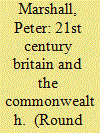

|
|
|
| 5 |
ID:
055403


|
|
|
| 6 |
ID:
076731
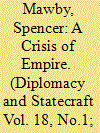

|
|
|
|
|
| Publication |
2007.
|
| Summary/Abstract |
The crises which accompanied the rise and decline of the European empires have not been the object of systematic study in the manner of superpower crises of the Cold War period. Many of the techniques used to study Cold War crises have broader scope, including the models of governmental politics and organisational process developed by Graham Allison. The application of the Allison models to the events surrounding the delimitation of the Aden frontier between 1901 and 1905 illuminates significant aspects of the Anglo-Ottoman confrontation: they explain the manner in which non-rational elements in the policy-making process transformed a relatively insignificant issue into a crisis situation. Such insights also require a detailed examination of the documentary record which in this instance reveals the discord amongst British policy-makers and the organisational imperfections of the bureaucracy. The frontier Commissioners, the Aden Resident, the Government of India, the metropolitan government in London and the embassy in Constantinople were involved in a series of factional squabbles over the Aden frontier, the resolution of which often required the coercion of the Ottomans by the deployment of warships along the Yemen coast. Coordination amongst these different elements in the bureaucracy also played a role in generating tensions between London and Constantinople. The case of the Anglo-Ottoman dispute over the Aden frontier suggests that the analysis of internal governmental politics and organisational processes can be applied successfully to crises of empire which predate the Cold War era.
|
|
|
|
|
|
|
|
|
|
|
|
|
|
|
|
| 7 |
ID:
020534
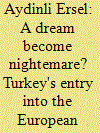

|
|
|
|
|
| Publication |
Nov 2001.
|
| Description |
381-388
|
|
|
|
|
|
|
|
|
|
|
|
|
|
|
|
| 8 |
ID:
020236
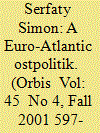

|
|
|
|
|
| Publication |
Fall 2001.
|
| Description |
597-607
|
|
|
|
|
|
|
|
|
|
|
|
|
|
|
|
| 9 |
ID:
020140
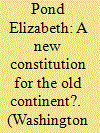

|
|
|
|
|
| Publication |
Autumn 2001.
|
| Description |
29-40
|
|
|
|
|
|
|
|
|
|
|
|
|
|
|
|
| 10 |
ID:
077575
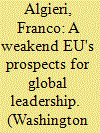

|
|
|
|
|
| Publication |
2007.
|
| Summary/Abstract |
After France and the Netherlands rejected the EU Constitution, the European integration project has reached a crucial stage. Even though the EU is still a world champion in trade policy and development aid, it is in danger of becoming an irrelevant power.
|
|
|
|
|
|
|
|
|
|
|
|
|
|
|
|
| 11 |
ID:
112820
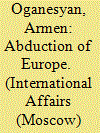

|
|
|
|
|
| Publication |
2012.
|
| Summary/Abstract |
WE ARE WATCHING the "abduction of Europe": the European dream of many generations of great European politicians is melting away. It was immediately after the war that Robert Schuman, Jean Monnet, Winston Churchill, Charles de Gaulle, Konrad Adenauer, Paul-Henri Spaak and many others laid the ideological foundation of united Europe. In 1962, Harold Macmillan disappointed his audience by saying to the EEC prime ministers that his country was determined to integrate into Europe. The British primer was convinced that his country could look forward to economic growth only as part of a big continental bloc. Today, the British press has dismissed this as a superficial and short-sighted approach which nevertheless was accepted by the larger part of the establishment and which cost dearly to the nation. The Brits, however, are often pushed aside as an insular nation. Le Monde of France betrays its concern by asking "Will Europe repeat the history of the USSR?" It admits, with a great deal of bitterness, that the integration institutes and Euro-bureaucracy which have grown out of proportion "are treated in Europe at best with indifference or at worst are totally rejected."
|
|
|
|
|
|
|
|
|
|
|
|
|
|
|
|
| 12 |
ID:
192142
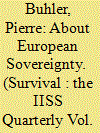

|
|
|
|
|
| Summary/Abstract |
The coining of the concept of ‘European sovereignty’ by French President Emmanuel Macron in 2017 has prompted a heated debate, reviving disputes over supranationality, the nation-state and democracy that have resonated since the inception of the European project. Macron’s intervention came at a time when a flurry of crises compelled the European Union to move from its ambition of being a ‘normative power’ to living through its ‘Machiavellian moment’, against the backdrop of the rise of new global powers and existential threats for the security of the Union and its member states. But the term ‘European sovereignty’ is a misnomer. The real issue is one of power, not of sovereignty. Power proceeds from command, hardly an attribute of the complex shared decision-making process of the EU, leaving the objective of becoming a fully-fledged power out of reach for the European polity.
|
|
|
|
|
|
|
|
|
|
|
|
|
|
|
|
| 13 |
ID:
107981
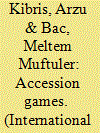

|
|
|
|
|
| Publication |
2011.
|
| Summary/Abstract |
We analyze the EU enlargement process from a rational institutionalist perspective and argue that the accession negotiations are designed to resolve the uncertainty that the existing EU members have in terms of the candidate's preferences. We model the negotiations as a Bayesian game and demonstrate how exactly the design in place helps the European Union in gathering information about the candidate country. Our model also enables us to compare alternative negotiation designs in terms of their ability to alleviate informational problems. We compare the resulting equilibrium payoffs under different negotiation designs to see whether there is any ground for a player to prefer a particular design over others. Our analysis supports the earlier arguments in the literature about the informative role of accession negotiations and demonstrates how exactly the negotiations carry out this role.
|
|
|
|
|
|
|
|
|
|
|
|
|
|
|
|
| 14 |
ID:
144496
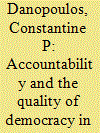

|
|
|
|
|
| Summary/Abstract |
This essay explores and assesses the connection between accountability and the quality of democracy in modern Greece along three key dimensions: vertical, horizontal, and social. Vertical involves elected officials and the three branches of government; horizontal deals with the nonelected arms of government and bureaucratic agencies; and social addresses civil society, the mass media, and nongovernmental organizations. Examination and analysis of the relevant data indicate that the state of accountability in Greece is weak in all three dimensions, and a host of structural, social, and attitudinal factors contributes to this weakness. Accountability problems undermine the quality of democracy. The essay expresses hope that reforms initiated under pressure from the European Union eventually would strengthen accountability and Greece’s quality of democracy.
|
|
|
|
|
|
|
|
|
|
|
|
|
|
|
|
| 15 |
ID:
091552


|
|
|
|
|
| Publication |
2009.
|
| Summary/Abstract |
In the context of emission markets, failure to include early action (EA) as a criterion when sharing out the reduction effort may be unfair. This paper presents (1) a method based on index decomposition that seeks to quantify EA and (2) a method for determining effort sharing considering EA. It is shown that, in the case of European industry (EU-15) and for the period 1995-2005, EA accounted for a reduction of 21% in energy-related CO2 emissions. Considering two alternative schemes for sharing out the reduction effort in European industry, equal shares (all industries in all countries reduce their emissions by the same percentage) and taking EA into account, we find that Spain, Austria, Italy, the United Kingdom and Sweden would be better off under an equal shares scheme as opposed to one that takes EA into account. The efforts of the remaining countries would be greater than if EA was taken into account. An equal shares scheme would also greatly benefit the textile, non-metallic mineral, paper and "other" industries, and would be particularly detrimental to the chemical, non-ferrous and other metal, and engineering industries.
|
|
|
|
|
|
|
|
|
|
|
|
|
|
|
|
| 16 |
ID:
121750
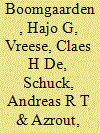

|
|
|
|
|
| Publication |
2013.
|
| Summary/Abstract |
News about the European Union (EU) looks different in different countries at different points in time. This study investigates explanations for cross-national and over-time variation in news media coverage of EU affairs drawing on large-scale media content analyses of newspapers and television news in the EU-15 (1999), EU-25 (2004) and EU-27 (2009) in relation to European Parliament (EP) elections. The analyses focus in particular on explanatory factors pertaining to media characteristics and the political elites. Results show that national elites play an important role for the coverage of EU matters during EP election campaigns. The more strongly national parties are divided about the EU in combination with overall more negative positions towards the EU, the more visible the news. Also, increases in EU news visibility from one election to the next and the Europeanness of the news are determined by a country's elite positions. The findings are discussed in light of the EU's alleged communication deficit.
|
|
|
|
|
|
|
|
|
|
|
|
|
|
|
|
| 17 |
ID:
091082
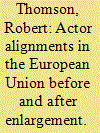

|
|
|
|
|
| Publication |
2009.
|
| Summary/Abstract |
What impact has the 2004 enlargement had on legislative decision making in the European Union (EU)? This study answers this question by examining the controversies raised by a broad selection of legislative proposals from before and after the 2004 enlargement. The analyses focus on the alignments of decision-making actors found on those controversies. Member State representatives, the European Commission and the European Parliament vary considerably in the positions they take on controversial issues before and after enlargement. Consistent patterns in actor alignments are found for only a minority of controversial issues. To the extent that consistent patterns are found, the most common involve differences in the positions of Northern and Southern Member States and old and new Member States. The North-South alignment was more common in the EU-15 and reflected Northern Member States' preference for low levels of regulatory intervention. The new-old alignment that has been evident in the post-2004 EU reflects new Member States' preference for higher levels of financial subsidies. This study argues that the persistent diversity in actor alignments contributes to the EU's capacity to cope with enlargement.
|
|
|
|
|
|
|
|
|
|
|
|
|
|
|
|
| 18 |
ID:
127065
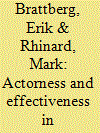

|
|
|
|
|
| Publication |
2013.
|
| Summary/Abstract |
This article examines the role of the European Union (EU) and United States as actors in international disaster relief. We take the analysis of 'actorness' one step further than normal by assessing the extent to which different aspects of EU and US actorness led to effectiveness in actual outcomes. In doing so, we make two contributions. First, we provide a rare comparison between EU and US foreign policy actorness, shedding light on the actor capability of each bloc in the area of international disaster relief. Second, we specify the relationship between actorness and effectiveness, a relationship which is too often assumed rather than explored. Using previous research of EU and US actorness as a starting point, we link four aspects of actorness to effectiveness and assess the resulting hypotheses using the case of the 2010 Haiti earthquake. We find support for our proposed links between actorness and effectiveness, although further research is needed before robust conclusions can be drawn.
|
|
|
|
|
|
|
|
|
|
|
|
|
|
|
|
| 19 |
ID:
113734
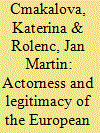

|
|
|
|
|
| Publication |
2012.
|
| Summary/Abstract |
The article surveys the current state of the academic debate about actorness and legitimacy of the European Union. It investigates various kinds of EU's actorness, as well as concepts and categories of its legitimacy, and attempts to trace their relationships, which remains an underdeveloped aspect of the discussion. We examine a wide range of scholarly articles, books and other academic sources in assessing the quality and fairness of the respective discussions and suggest that, within the current mostly normative debate, a positive evaluation of the EU's legitimacy is unattainable and that it is necessary to acquire a fairer notion of what kind of international actor the Union is.
|
|
|
|
|
|
|
|
|
|
|
|
|
|
|
|
| 20 |
ID:
094672
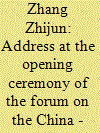

|
|
|
|
|
|
|
|